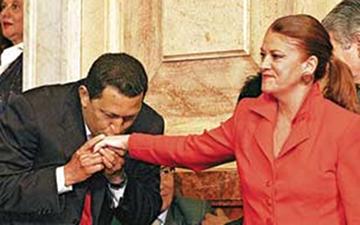The Falklands (or the Malvinas Islands) is the world’s most hotly-disputed off-grid territory. Now, just as the UN Secretary-General exhorts Britain and Argentina to step down from the sabre rattling, a new player has appeared, in the form of Trade Union activist and bon viveur, Alicia Castro. The 62-year-old former Stewardess on Aerolineas Argentinas has been moved from the post of Ambassador in Caracas, where she became extraordinarily close to Venezuelan President Hugo Chavez (pictured to left of Castro), to take up her new role as Ambassador at the Court of St James.
Embassy staff are agog, knowing that she is a fierce supporter of Malvinas repatriation, and will almost certainly send some of the existing retinue back to Buenos Aires, where she is a key confidante of Christina Kirchner.
“We take with great satisfaction the decision to name an Argentine ambassador to London,” stated a spokesperson for the British Foreign Office a day after the nomination of Castro to the position.
“We hope that this provides us with the opportunity to strengthen the cooperation between our two countries, including bettering bilateral relations, working together on world challenges such as combating climate change and strengthening collaboration in science and innovation,” the spokesperson added, without mentioning the differences between the two countries over the Falklands/Malvinas Islands sovereignty dispute.
The designation of Alicia Castro in the role that had been vacant for nearly four years comes at a time of escalated tension between Argentina and the UK over the sovereignty of the Malvinas islands, nearing the 30th anniversary of the Malvinas war in April.
The Argentine foreign ministry sent out a communiqué on Thursday stating “on this occasion the Argentine government would like to reiterate, again, their request for dialogue with the British government to comply with the resolutions made by the United Nations over the matter of the Malvinas Islands.”
Castro takes Federico Mirrés place, the previous and last Argentine ambassador to the UK, who left office in August 2008 at the end of his mandate.
The Argentine government decided to leave the position empty in protest to Britain’s refusal to engage in dialogue over the bilateral conflict.
Last December 21st, during an end-of-the-year toast, Fernández de Kirchner had said that Argentina “would be appointing and ambassador to the UK very soon.”
Castro’s designation to London is a sign by the Government, which chose someone from the union sector instead of a career diplomat.
